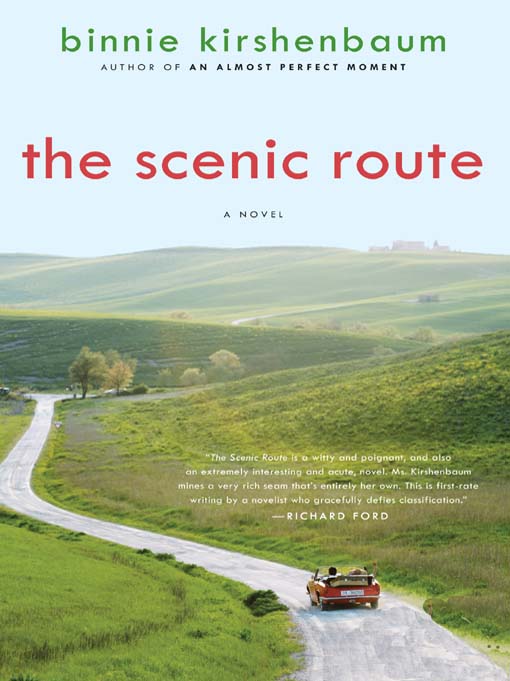
The Scenic Route
کتاب های مرتبط
- اطلاعات
- نقد و بررسی
- دیدگاه کاربران
نقد و بررسی

Starred review from March 16, 2009
It takes skill and assurance to pull off this beguiling narrative-by-digression, a love story–cum–family history–cum–confession of sins, and Kirshenbaum (An Almost Perfect Moment
) has both in plentiful supply. A romantic affair begins in Fiesole when narrator Sylvia Landsman, an out-of-work, 42-year-old New York divorcée, meets debonair Henry Stafford, a Southern-born expatriate with expensive tastes and a good nose for wine. At the outset, Henry reveals that he is married to a rich woman who permits his lavish expenditures, and yet Sylvia—cynical, wry and imbued with Jewish guilt—dares to hope that Henry will be the man who changes her life. While the lovers enact a contemporary Two for the Road
in his green Peugeot, Sylvia entertains Henry with stories about her eccentric family, meanwhile disclosing her own foibles and hang-ups—including some portents about betraying her best friend, Ruby. Sylvia segues from comedic quips to sad aperçus, and from cultural markers to historical vignettes, finally confessing the sin of omission that ended her friendship with Ruby. What's crushing isn't Sylvia's secret—it's how knowledge hasn't made her wiser. There are no happy endings here; instead, Kirshenbaum delivers capital-T truths.

March 15, 2009
Kirshenbaum's distinctive voice transforms a lightly plotted novel into an enchanting, tangent-strewn meditation on memory, love and luck.
When Sylvia (a 40-ish, divorced Manhattanite) looses her job, she decides to visit Italy on a lark. In Florence she meets Henry at a caf, and the two fall into something—maybe love, maybe not—but either way, they hop into his car and go. Henry's heiress wife is off in India with her guru, leaving Henry alone, as he often is. With a taste for expensive drink, good food and fancy hotels, he knows how to show a girl a good time. The two have a map of Europe, time and lots of his wife's money to spend, and so as they drive from one cobblestone village to the next, Sylvia tells Henry stories. Many about her peculiar relatives (mental illness is a distinguishing family feature); about her mother's death and her father's new girlfriend; about Raisinets and the many romances of Alma Schindler; about the broken heart of Aunt Semille; about pet cemeteries and war cemeteries and her not entirely terrible childhood; and finally, repeatedly, about her best friend Ruby, who pops in and out of their ongoing conversation about love and life. The novel's first line foretells the end of the romance, so the narrative is a meandering, slightly sorrowful account of two people in love, but not quite brave enough to come up with a plan for a shared future.
Lovely prose and quirky observations carry Kirshenbaum's seventh novel (An Almost Perfect Moment, 2004, etc.).
(COPYRIGHT (2009) KIRKUS REVIEWS/NIELSEN BUSINESS MEDIA, INC. ALL RIGHTS RESERVED.)

March 15, 2009
Award-winning author Kirshenbaum (e.g., "A Disturbance in One Place") here blends the story of a love affair with one character's recollection of her immediate and ancestral family. While on vacation and with her future plans adrift, Sylvia Landsmandivorced, American, and Jewishmeets Henry, an expatriate living in Europe who also has ample time on his hands. Initial strong mutual attraction prompts these two to begin traveling Europe's back roads together, with Henry at the wheel. During their excursion from town to town and villa to villa, Sylvia relates the story of her life and her family's background. What she reveals is both humorous and at times disturbing. The shifts between past and present can be abrupt and disconcerting, but they become less problematic as the novel progresses. Ultimately, Kirshenbaum seems to be telling us that it is perhaps this filling in of all the gaps, when the future is uncertain, that allows love to grow. Recommended for all academic fiction collections and larger public libraries.M. Neville, Trenton P.L., NJ
Copyright 2009 Library Journal, LLC Used with permission.

April 15, 2009
After abruptly losing her job, Sylvia escapes New York and flies to Florence. This might sound larky, but shes carrying excess baggage literally and emotionally. She hooks up with handsome, well-off Henry, and off they go, meandering across Europe in an erotic fugue state. They even take the scenic route when it comes to sharing their family histories, skirting inconvenient facts and selecting more picturesque elements. Sylvia is stand-up-comic hilarious, going off on uproarious tangents involving everything from Raisinettes to shampoo, assimilation, and Arthur Murray dance studios, and issuing zingers of startling precision. Its good, droll fun, until pleasure gives way to denial, lies, and desperate measures, and the full implications of their pasts emerge. Not only are Sylvia and Henry fugitives from unloving parents and their own terrible mistakes, Sylvia also carries the indelible wounds of the Holocaust. Absurdly underrated Kirshenbaum is at her darkly comic and boldly encompassing best here, diverting us with hairpin-turn humor while slipping us hard truths about memory and inheritance, betrayal and guilt, and the inevitable end of the road.(Reprinted with permission of Booklist, copyright 2009, American Library Association.)

























دیدگاه کاربران